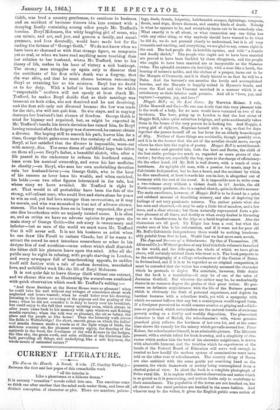Maggie Bell; or, the Lost Sister. By Warwick Holme. 2
vols. (John Maxwell and Co.)—No one can doubt that this very pleasant tale is the work of a lady, for no man would have ventured on two of the incidents, The hero, going up to London to find the lost sister of Maggie Bell, takes quiet suburban lodgings, and quite accidentally takes them in the house of the very person he is looking for. And Maggie, a young girl of eighteen, disguises herself with a wig, so that for days together she passes herself off on her lover for an elderly housekeeper of fifty. Neither of these things are verisimilia, though possibly Vera, and it is in the former that the art of the novelist should move, except where he rises into the region of poetry. Maggie Bell is notwithstand- ing a tender and graceful tale, both the hero and Bertie, the child of the lost sister, perhaps too much so, regarded as mere pieces of cha- racter; for they are, especially the boy, open to the charge of effeminacy. On the other hand, old Mr. Bell is well drawn, with a touch of over- harshness. An upright old man, with a passion for music, may be a Calvinistic Independent, but he has a heart, and the accident by which he dies unsoftened, at least towards his son-in-law, is altogether out of harmony with the rest of the novel. Is it impossible now to write even a two-volume story without a violent death in it ? Archie, the old North-country gardener, also is a capital sketch, quite in Scott's manner. The main excellence, however, of Maggie Bell is to be found in a quiet and subdued manner of describing scenery, and also of depicting the feelings of not very passionate natures. The author paints what she has seen and observed,—it may be only a little bit of meadow, and a few trees, and a clear stream ; but those naturally represented form a pic- ture pleasant at all times, and doubly so when every dauber is thrusting on one a thunderstorm in the Alps or a lurid tropical sunset. Also the characters are all good. Sir Edgar has been a rout, but what the reader sees of him is his reformation, and if it were not for poor old Mr. Bell's Calvinistic Independence there would be nothing irredeem- ably painful from first to last. Would that we had more such novels.






























 Previous page
Previous page